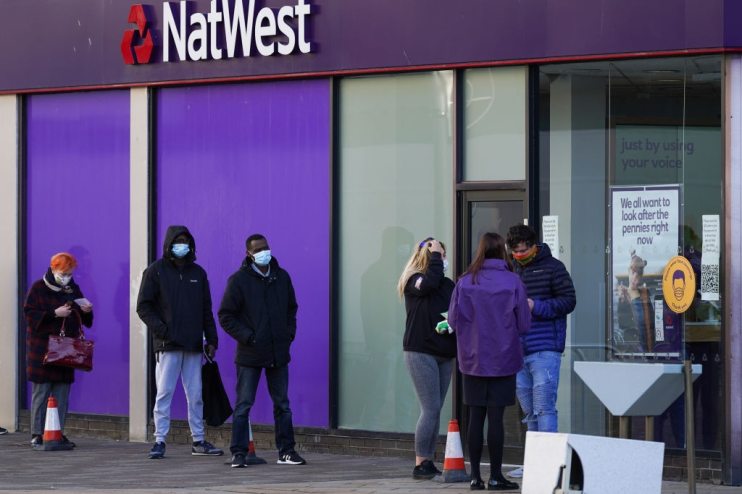Mark Kleinman: Natwest’s future, Ovo Energy and Hargreaves Lansdown’s search for a successor

Mark Kleinman is City editor at Sky News
What next for Natwest? Somebody with a tighter grip at the top, and that’s just the start
Banking with the human touch: that’s how Coutts, the high net worth bank owned by Natwest Group, likes to position itself. Like so many corporate slogans, however, it often bears little resemblance to reality.
The hole that Natwest, still 39 per cent-owned by British taxpayers, has dug itself into over the closure of Nigel Farage’s Coutts accounts is entirely self-inflicted and utterly unforgiveable.
Once it became clear that Rishi Sunak and Jeremy Hunt had lost confidence in her leadership, Dame Alison Rose’s fate was sealed. But how could it have been otherwise? Set all the weaselly-worded excuses to one side and it boils down to this: the CEO of a bank divulged confidential, and erroneous, information about a client to a journalist to serve her own purposes.
Nobody emerges from this sorry affair with any credit (although I’ll leave it to others to dissect the BBC’s failings in it), other than – dare I say it – Farage himself.
Nevertheless, the former UKIP leader’s demand yesterday that the rest of the Natwest board should follow Rose out of the door was crass. Bank boards cannot resign en masse, as Farage well knows.
In any case, Sir Howard Davies, the chairman, was already due to step down, with a search underway. Unfortunately for Farage, Rose’s defenestration is likely to prolong, rather than shorten, the chairman’s tenure.
But Davies will know that he is now no more than a lame duck chairman who does not command the respect of his biggest and most important shareholder. He can only hope that the selldown of the government’s stake proceeds as quickly as possible.
The affair raises other troubling questions about the bank’s culture and processes, but also the autocratic behaviour of its now-departed chief executive.
Rose’s collection of external roles – there were seven listed on the Natwest website at the point of her departure – was excessive and speaks to a lack of control. City investors to whom I have spoken say she sought to exert a level of control that was faintly reminiscent of the most famous RBS CEO of all: Fred Goodwin.
Then there were the regularly-surfacing rumours of tensions between Rose and Davies during the four years she was in charge.
The government remains a passive shareholder in Natwest. But after this fiasco, it’s obvious that Natwest – and therefore taxpayers – would benefit from a chairman who has a tighter grip and a chief executive more singularly focused on their day job.
Irish eyes are smiling after Ovo deal
Stephen Fitzpatrick has had a tidy week. Ovo Energy’s founder landed a big windfall – the company refuses to say how big – from the sale of a chunk of his stake to other investors.
The company says the transaction was valued at £200m, although it is curiously reticent about the overall valuation implied by the deal.
In any case, Fitzpatrick must have taken tens of millions of pounds off the table, while Mayfair Equity Partners and Morgan Stanley Investment Management have absorbed some of the Irishman’s shares.
I can also disclose that Ovo is now close to recruiting a separate chair for Kaluza, its intelligent energy platform. Ovo denies it’s the prelude to a break-up of the group, but I’m not so sure.
Olley’s Hargreaves Lansdown arrival could signal a winning hand for restive founder
FIRST blood to Peter Hargreaves? That’s the logical conclusion to draw from the bizarrely worded confirmation from the funds supermarket Hargreaves Lansdown that it has begun a search for Deanna Oppenheimer’s successor as chairman.
In a stock exchange announcement confirming my report on Sky News, the company said it had “commenced an exercise to determine the attributes of any successor chair candidates. No decisions have been taken at this time.”
Surely the directors of a FTSE 100 company are aware of the “attributes” its chair requires?
Mangled language like that either implies a board determined not to appear as if it’s caving in to its activist founder, or one which is genuinely confused.
Given Hargreaves’s previous outbursts, labelling Oppenheimer’s tenure “a disaster”, I suspect it’s the former.
The latest downgrade, from analysts at Deutsche Bank, called a recent, modest rally in the stock an “overreaction” to a trading update this month.
Hargreaves has yet to propose – at least publicly – an alternative plan for the company. Much of his irritation appears to stem from the company’s inflated cost base.
Some senior executives are said to have worked almost entirely remotely since the pandemic, while one person close to the co-founder said others had incurred huge taxi bills commuting from distant homes.
The arrival of Dan Olley – already on the board as a non-executive director – buys the company some time. Olley, who has had to be patient while extricating himself from Tesco, is likely to face pressure from Hargreaves to refocus the business on drawing higher-margin – rather than greater volumes of – clients.
Nevertheless, people close to the co-founder say he is supportive of the appointment and aligned with his objective to secure higher-wealth clients.
With the disclosure this week that Robinhood Markets has recruited a new boss to spearhead its UK launch, Olley doesn’t have a moment to lose.
